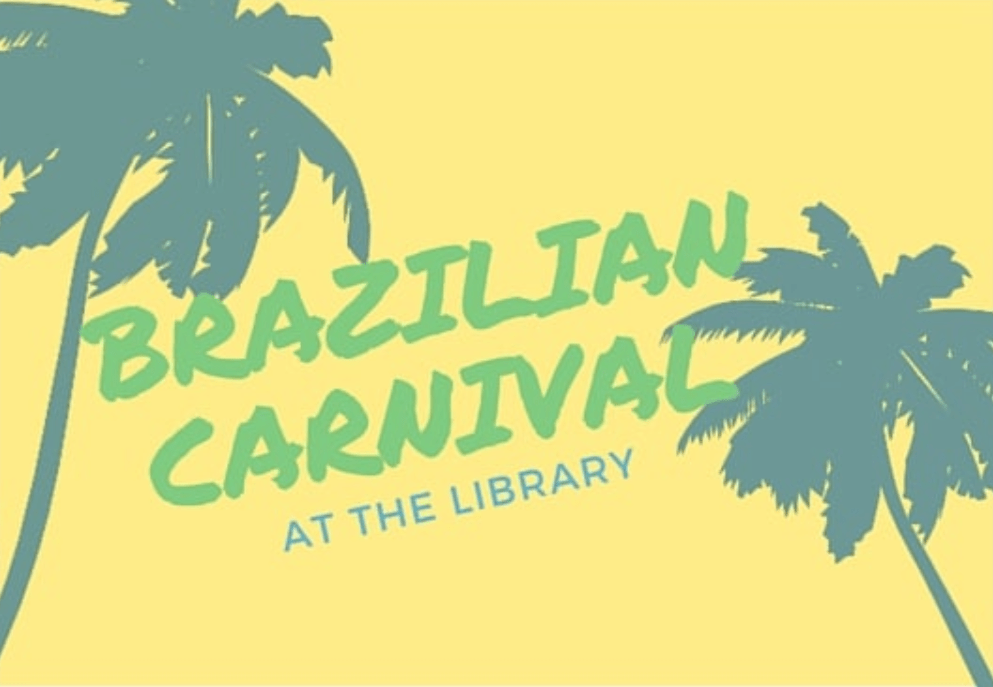

A Brazilian combo, Porto Seguro, with guest vocalist, Ann Caldwell present a tour of Brazilian music, culture and Carnival traditions at the Charleston Library Society. Join the fun on Tuesday, February 9 at 7:30 for Mardi Gras — the last night of Carnival week — and experience the colorful diversity of the Brazilian celebration. Ann Caldwell and Porto Seguro will perform a concert of Brazilian Choro, Bossa Nova and Samba, supported by images from throughout Brazil. The evening will culminate in a reception with caipirinhas (Brazil’s national drink), samba dancing, more music and the drumming of Capoeira Charleston.
Tickets for this event are $25 for members, $35 for nonmembers, and $10 for students (with valid ID). To purchase call 843-723-9912 or click here.
Guest vocalist, Ann Caldwell, beloved in the Charleston area for her virtuosic jazz chops and leadership of the Magnolia Singers, has the quiet energy of a windmill yet the soulful voice and power of a locomotive. Ann’s rich, organic sound wraps around a note, then takes it and the listener to a different space in time. Ann brings a unique rhythm to every, beat and word. Ann will lend her vocal stylings to some of Brazil’s best known samba and bossa classics.
Porto Seguro is four talented musicians from diverse backgrounds playing three musical styles considered the roots of Brazilian jazz: choro, bossa nova andsamba. Choro, originating from the early 20th century, combines Afro-Brazilian and European sounds into a happy-go-lucky mix that simply makes you want to smile. Bossa nova (think Tom Jobim, João Gilberto and Stan Getz) and put Brazilian music front and center on the world stage in the 1950’s, but choro was the first true Brazilian pop music. Almost all the music played during the Rio Carnival is samba, a uniquely Brazilian dance form originating from Afro-Brazilians. The word samba comes from the Angolan world semba referring to a type of ritual music. The word had a variety of meanings to the African slaves brought to Brazil during the 17th, 18th and 19th centuries. It meant to pray or invoke the spirits of the ancestors and the gods of the African Pantheon. As a noun, it could mean a complaint, a cry, or something like “the blues”.
All three styles present a distinctively Brazilian combination of bravado, laid-back vibe, rhythm and soul. They require a delicate balance between expert instrumental technique and the ability to ease into the groove. Members, Susan Conant, flutes; John Holenko, mandolin; Tom Noren, guitar and Jonathan Kennedy, bass provide just that. Their entertaining and informative program explores a range of moods and instrumentations. Audiences rave about their performances which have occurred in both quiet indoor listening rooms and at outdoor community picnics.
“The concert last night was simply amazing. There must have been 200 people and they stayed and stayed.”
“The whole evening was magical.”
“It was a wonderful night for sure. The music was great, the weather perfect and even my kids had a lot of fun.”
Porto Seguro’s members hail from diverse backgrounds but have one important quality in common — they are all devoted to making excellent music. Each member of the group brings a different perspective and the result is a kind of cross-cultural sharing that produces a unique but cohesive blend of Brazilian music with an American twist. The players are all top notch and the music sublime.
Capoeira Charleston is a fun and diverse group of Capoeira and Brazilian dance enthusiasts led by professor Quiexo. Capoeira (pronounced “cop-o-way-rah”) is an extraordinary and unique martial art that finds its origins among the African slaves in Brazil. It combines self-defense, acrobatics, dance, music and song. Its martial aspects began developing in the 16th and 17th centuries, as a means of protection by the slaves from their owners. It was consequently banned, and became hidden in a dance; it was ‘played’ within a circle of onlookers and musicians using percussive and stringed instruments- primarily the berimbau, a stringed bow-like instrument from Angola. It was in the circle (a roda in Portuguese) where highly skilled capoeristas performed their art using a system of kicks, leg sweeps, and flips.